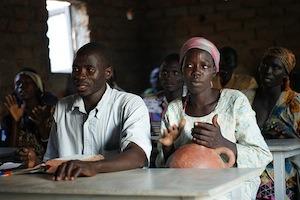
It is no secret that education is the surest route to a better life, but for tens of thousands of low-income students in developing nations, high costs mean that access to it continues to be the stuff of fantasy. Student loans are notoriously hard to come by outside of the U.S. and Europe, largely due to the fact that banks have no track record of repayments that can be used to assess risk, and students generally don’t have collateral or a credit history to prove that they can pay back loans.
The answer to this classic "chicken-or-the-egg" problem could lay with crowdfunding, which not only presents an opportunity to get tuition loans to students who need them, but also to build a “track record of repayment” that will encourage financial institutions to offer more loans to students.
Vittana.org uses crowdfunded student loans to help people in regions where higher education is out of reach but job opportunities exist for graduates of colleges and technical and vocational schools. The nonprofit partners with local organizations and micro-finance institutions (MFIs) to create tuition loan programs for students who are close to graduation but need money to pay final tuition in order to graduate. Loans average $750, and a repayment rate of 99 percent, which shows that students will pay back their loans if given the opportunity. As students continue to successfully repay their loans, they are creating that repayment history and opening the door for millions of other students in the future.
Beginning on April 2, all student loans sourced by Vittana.org will be posted on Kiva’s website for crowdfunding rather than on the Vittana website. Visitors will be able to browse through the stories and profiles of students and select one they want to support with a loan of $25 or more.
Kiva connects millions of people around the world through lending to alleviate poverty in areas lacking access to traditional banking systems. With as little as a $25 loan, anyone can help a borrower to start or grow a business, go to school, access clean energy and realize his or her potential. Since its inception in 2005, Kiva says more than 1 million people have used its crowdfunding platform to lend more than $500 million in loans to over 1 million borrowers, with a 98 percent repayment rate.
In 2014 Kiva and Vittana expect to help 20,000 students access crowdfunded tuition loans in Latin America, Southeast Asia and Africa. The partnership will allow Vittana to focus its efforts on expanding technical assistance for both student applicants and MFIs wanting to create loans tailored for student needs.
"Access to education sits at the crux of poverty and economic development,” said Premal Shah, co-founder and president of Kiva. “With Kiva and Vittana working together, we can help to break the cycle of generational poverty and expand access to higher education by proving to financial markets that students can and do pay back loans.”
According to Vittana’s 2014 comprehensive impact report, among Vittana.org students surveyed, 85 percent were employed a year after graduation. Students also were able to increase their incomes by an average of 93 percent. The collective increased earnings of 20,000 students is more than $65 million per year, helping lift themselves, their families and their communities out of poverty.
“Through education we can empower the youth of the world to alleviate poverty, gender inequality, violence, malnutrition, pollution and many of the other battles constantly faced around the world–nourishing a virtuous cycle of change,” said Robin Wolaner, CEO of Vittana.
Just as Benjamin Franklin once said: “An investment in knowledge always pays the best interest.”
Image credit: Kiva.org
Based in San Francisco, Mike Hower is a writer, thinker and strategic communicator that revels in driving the conversation at the intersection of sustainability, social entrepreneurship, tech, politics and law. He has cultivated diverse experience working for the United States Congress in Washington, D.C., helping Silicon Valley startups with strategic communications and teaching in South America. Connect with him on LinkedIn or follow him on Twitter (@mikehower)
Currently based in Washington, D.C, <strong>Mike Hower</strong> is a new media journalist and strategic communication professional focused on helping to drive the conversation at the intersection of sustainable business and public policy. To learn more about Mike, visit his blog,<a href="http://climatalk.com/" > ClimaTalk</a>.














